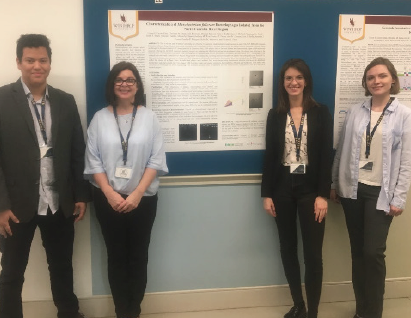There are over 10 to the power of 10 nonillion bacteriophages in the world, and only three thousand of these have been discovered. But what are bacteriophages? Bacteriophages are viruses that infect a bacterial host.
This year is the third year the Winthrop University Biology Research Department has participated in the Science Education Alliance-Phage Hunters Advancing Genomics and Evolutionary Science program.
The program is designed for undergraduate freshmen to get involved in research early in their college career to prepare them for future research endeavors. It is only two semesters of research. In the first semester, students isolate and characterize bacteriophages they have collected from soil samples. The second semester students annotate specific viruses chosen using many bioinformatics programs.
“The contributions of the SEA-PHAGES students have been essential to our current understanding of the diversity of bacteriophages and substantially advances the field of phage genomics. The increasing knowledge of bacteriophage biology and host-phage evolution is particularly relevant to the control of bacterial infectious disease especially in light of the increasing problem of antibiotic resistance,” Victoria Frost, a biology professor, said.
Frost and Kristi Westover, a biology professor, are the two professors who are mainly involved in the program and encourage freshmen at orientation to sign on this wonderful opportunity.
Frost spoke of the goals and benefits she hopes her students will obtain by the end of the two semester research.
”[My goal for them is to] experience a sense of ownership of a scientific project, think independently, critically and appropriately, acquire additional laboratory techniques above and beyond those in a regular introductory biology lab course, experience close student-faculty interactions and effective mentoring, communicate results and ideas successfully, [and] develop professionally by networking with other SEA-PHAGE participants and presenting their research,” Frost said.
Students are able to present their research from the program at an array of conventions to get them prepared to present research professionally later on in life. Some of these conventions includes Winthrop University’s SOURCE convention, Biology Department’s undergraduate research showcase, the South Carolina branch of the American Society of Microbiology, the South Eastern Undergraduate Science Symposium and the National SEA-PHAGE Symposium.
“It’s been an amazing experience, and I’ve really appreciated the opportunity. Both semesters in SEA-PHAGES were new and fascinating experiences that helped me to figure out what research I might like to do in the future. I’ve learned and practiced lab techniques and gotten experience in DNAMaster [a bioinformatics tool],” Allison Stanek, a biology major, said.
Carlos Escoto-Diaz, a biology major, said that it is important for freshmen to look into this opportunity.
“Any student with an interest in microbiology or that needs to fulfill a science lab should consider the SEA-PHAGES program. Student should know about this program so that they may be immersed into scientific research and make their own discoveries (eg. virus),” Escoto-Diaz said.




